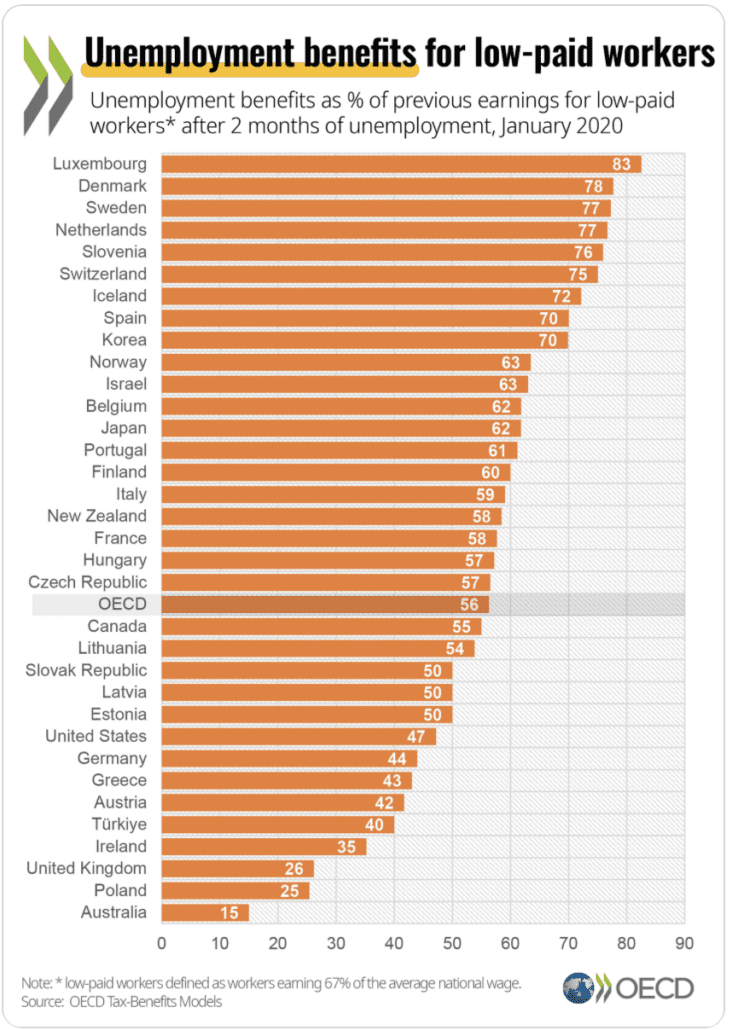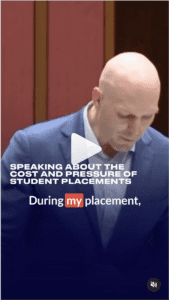
Can students really afford to study?
With Australia currently experiencing very low levels of unemployment, with the government having provided additional funding for extra university places for disadvantaged students, the rollout of Fee Free TAFE, and the extension of the Trade Support Loan scheme to help a wider group of students meet their living costs while studying – now might seem an odd time to ask if students can afford to study?
Yet I just can’t stop thinking about what the latest OECD unemployment report shows and how badly it reflects on Australia. It measures unemployment benefits based on the ‘net replacement rate’ (NRR) ie how the unemployment benefit compares to the previous earnings of low income workers.
And as you’ll see, Australia comes last by a VERY long way when it comes to the benefits paid to people after 2 months of unemployment.

Australia’s comparative performance with other OECD countries improves the longer someone is unemployed, as other countries’ more generous assistance is wound back. We rate just above the OECD average for the NRR after 3 years of unemployment, but what the chart above shows is that we place much less value than other comparable countries, on supporting people in the initial months after they lose their jobs. That policy approach in turn interacts with the VET and higher education sectors.
Last year, 1 in 10 VET students (442,000) self-reported as being unemployed but the true number of unemployed VET students is unknown, because some chose not to disclose their employment status when enrolling. While many people have welcomed the government’s Fee Free TAFE and other VET program – in fact VET courses for unemployed people have always been Fee Free, so the extra places do not provide greater access to VET for people who are unemployed.
Further, as The Saturday Paper has recently reported, many of these unemployed VET students are enrolled in training programs delivered by the employment services provider the Federal government is funding to assist them to find work. Questions around the efficacy of this training continue to be asked.
In higher education, where the majority of students are school leavers enrolled in full-time undergraduate degree programs – data is not reported on students’ labour force status because, by definition, full-time students are studying not unemployed.
Like full-time unemployed VET students, unemployed university students are eligible for income support (Youth Allowance or Austudy) but the payment rates are so low, their adequacy to help students meet their living expenses while studying must also be called into question. This situation becomes even more difficult with the increased emphasis on unpaid work-integrated learning opportunities in higher education.
A few months ago, writing in Campus Morning Mail, I highlighted the problems associated with requiring students to undertake mandatory unpaid workplacements and argued that “we cannot afford for only middle-class domestic students to be comfortably able to access these (work-integrated learning) opportunities.”
The answer in the VET sector, to help students meet cost of living expenses, has been to expand access to the income contingent Trade Support Loan scheme – which allows students to borrow money from the government to meet living expenses while they are studying. The scheme is a reasonable option for students enrolled in courses with high average earnings after graduation, but for those going on to work in the aged care or retail sectors (earning an average salary of approx. $70,000 pa) is it fair to be burdening them with thousands of dollars of debt (students can borrow up to $24,492) to help them make ends meet while studying?
Drawing on lessons from a recent study tour to Canada, I argued in the Campus Morning Mail article for paid work placements but made the point that – “if employers in Canada and elsewhere in the world pay students on workplacements, Australia should expect the same. These opportunities need to be equally open to all students.”
Speaking in the Federal Parliament this week, Senator David Pocock made the point much more eloquently:
Surely as a country we can do better?




